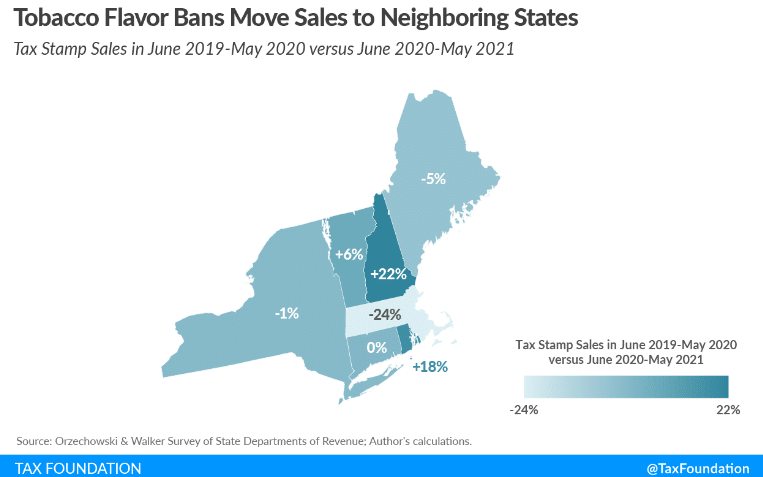Chair Baldacci and members of the committee,
Thank you for the opportunity to submit testimony on the proposed ban of flavored tobacco products.
My name is Guy Bentley, and I am the director of consumer freedom at the Reason Foundation, a 501(c)3 nonprofit think tank. The consumer freedom project analyzes and promotes policy solutions that improve public health while avoiding unintended consequences and protecting consumer choice.
The intention behind Legislative Document 1174 to limit tobacco use, especially among youth, is to be applauded. However, the track record of such prohibitions should raise significant concern that the proposed ban would unintentionally promote inequalities in the criminal justice system, push Maine’s sales and tax revenue to other jurisdictions, and increase the illicit tobacco trade in the state while failing to improve public health.
Case Studies: Massachusetts, Canadian Provinces, and the European Union
Massachusetts’ ban on flavored tobacco products went into effect in June 2020. My colleague Jacob Rich of the Center for Evidence-Based Care Research at the Cleveland Clinic analyzed the flavored tobacco ban’s impact by comparing cigarette sales in Massachusetts before and after the ban was implemented. His research found a net increase in cigarette sales of 7.2 million packs within Massachusetts and its bordering states in the 12 months after the ban (to June 2021) compared to sales in the year leading up to the June 2020 ban.
Massachusetts experienced a 15.6 million pack increase in non-menthol cigarette sales in 2021, likely due to smokers switching to other products after the flavored tobacco ban’s implementation. Additionally, with consumers turning to neighboring states and black markets, according to the Tax Foundation, Massachusetts lost $125 million in tobacco tax revenue in its 2021 fiscal year.

Flavored tobacco bans in other countries have yielded similar unintended results. According to a study published by the Journal of Law and Economics, Canadian provinces’ menthol prohibition implemented from 2015-17 significantly increased non-menthol cigarette smoking among youths, resulting in no overall net change in youth smoking as they substituted products rather than quit. “Difference-in-differences models using national survey data return no evidence that provincial menthol cigarette bans affected overall smoking rates for youths or adults,” wrote the study’s authors.
The world’s largest experiment in menthol prohibition is the European Union, which includes 27 countries and had a population of 447 million people as of 2020. The EU menthol ban became effective in May 2020. Before the ban, Poland had the largest menthol cigarette market in the EU, making up 28 percent of total menthol sales. An analysis of Poland funded by the Norwegian Cancer Society in partnership with the Polish Ministry of Health found no statistically significant decline in overall cigarette sales in Poland after the ban. “We find that menthol cigarette sales fell at least 97% after the menthol cigarette ban across Poland and standard cigarette sales replaced them,” wrote the study’s authors.
Food and Drug Administration Review and Tobacco Harm Reduction
The Food and Drug Administration (FDA) recognizes there is a “continuum of risk” when it comes to tobacco products, with cigarettes being the most dangerous and alternatives such as e-cigarettes, smokeless tobacco, nicotine pouches, and heated tobacco products being less dangerous. As such, when the FDA authorizes a new tobacco product for sale, it must be evaluated as to whether it is “appropriate for the protection of public health,” meaning the product must provide a net benefit to public health.
L.D. 1174 would ban the sale of several products that the FDA has deemed to be net beneficial to public health and authorized for sale. For example, Swedish Match’s General Wintergreen Portion White Large, General Nordic Mint Portion White Large—12 count, General Mint Portion White Large, and General Dry Mint Portion Original Mini have also obtained Modified Risk Grant Orders from FDA. These orders allow Swedish Match to inform the public about the benefits of switching from cigarettes to these reduced-risk products. According to the FDA, the claim, “Using General Snus instead of cigarettes puts you at a lower risk of mouth cancer, heart disease, lung cancer, stroke, emphysema, and chronic bronchitis” is scientifically accurate.
If Maine chooses to ban these products, it will ban products that reduce the harm and risk of tobacco-related diseases. But it’s not just these products that are under threat from L.D. 1174. In 2021, the FDA authorized an e-cigarette as appropriate for the protection of public health for the first time. The FDA is also currently reviewing e-cigarette product applications in flavors other than tobacco or menthol that contain reams of data on safety, efficacy, and potential threats to youth.
In 2021, FDA authorized an e-cigarette as appropriate for protecting public health for the first time. The FDA is also reviewing e-cigarette product applications that contain reams of data on safety, efficacy, and potential threats to youth. If the FDA finds that any product is a net harm to public health, it will be removed from the market. But if the product is deemed net beneficial, it will be authorized for sale as appropriate for the protection of public health.
If Maine passes L.D. 1174 into law and bans these products before the FDA concludes its review, it would limit consumer access to products the FDA may deem positive for public health. According to a survey conducted by the International Tobacco Control Policy Evaluation Project, 57 percent of vapers said they would continue vaping if flavors were banned, while half said they would find a way to get their preferred flavor. Of most concern to public health officials and lawmakers should be the finding that close to one in five vapers said if their preferred flavor was banned, they would stop vaping and smoke traditional cigarettes instead.
While prohibiting e-cigarette flavors other than tobacco may seem an attractive solution to reduce youth vaping, policymakers should recognize that according to the 2022 National Youth Tobacco Survey (NYTS) by the Centers for Disease Control and Prevention (CDC), 86 percent of high schoolers are not using e-cigarettes at all and 98 percent are not smoking combustible cigarettes. Data released by the CDC also shows flavors are not the leading reason why youth initiate vaping. According to the CDC, the primary reason why young people say they start vaping is curiosity, followed by peer influence or family members. Availability in flavors, such as mint, candy, fruit, or chocolate, comes as a very distant third in the survey.
Research suggests banning flavored tobacco products may also induce perverse outcomes contrary to the promotion of public health among adolescents. In 2018, San Francisco banned the sale of all flavored tobacco products, including e-cigarettes with flavors other than tobacco. Yale University’s Abigail Friedman found that after the flavored tobacco ban was enacted, San Francisco area youth were twice as likely to smoke compared to young people in similar jurisdictions that had not enacted tobacco flavor bans. “While neither smoking cigarettes nor vaping nicotine are safe per se, the bulk of current evidence indicates substantially greater harms from smoking, which is responsible for nearly one in five adult deaths annually. Even if it is well-intentioned, a law that increases youth smoking could pose a threat to public health,” found Friedman.
According to a 2020 study by Yale School of Public Health researchers, e-cigarette flavors are positively associated with smoking cessation outcomes for adults but not associated with increased youth smoking. The prestigious Cochrane Review concluded e-cigarettes are more effective than traditional nicotine replacement therapies in helping smokers quit smoking cigarettes. Prohibition of flavored e-cigarettes, which are overwhelmingly the preferred choice for adult vapers, risks worsening public health by driving vapers to smoke while also fueling illicit markets and hurting local economies by forcing the closure of Maine’s vape shops.
The proposed ban on flavored e-cigarettes carries potential negative consequences for the health of Maine’s citizens, and it may also hurt the state’s economy.

